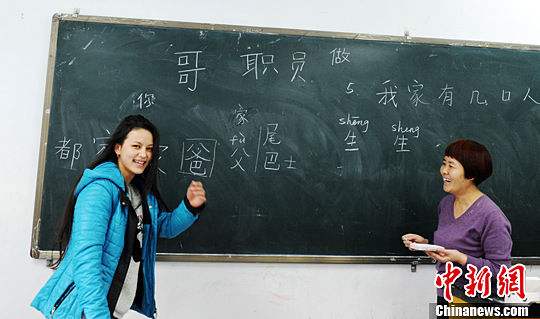

(Photo/Chinanews.com)
“We have just started to simulate train driving. So far, I haven't found it too difficult, as I already had some training in China,” said Atithan, a Thai student sitting in front of a high-speed railway simulation system in Banphai Industrial and Community Education College, a vocational school in Thailand’s Khon Kaen province.
Atithan is one of many Thai students who has benefited from the education and training program jointly launched in 2014 by China and Thailand to cultivate railway talents.
Atithan and other students in the program received training in Chinese language at the Confucius Institute at Khon Kaen University, and then went on to study in China for a few months. After that, they entered relevant vocational schools to learn professional training about high-speed rail.
Chinese language training under the framework of the China-Thai high-speed railway has been held for four sessions since 2016. It has cultivated more than 100 railway talents for Thailand, according to Hu Lin, Chinese Director of the Confucius Institute at Khon Kaen University.
The training has promoted China-Thai cooperation in vocational training and has become a model of the “Chinese plus vocational skills” talent cultivation mode, noted Hu.
At the end of 2017, the construction of a high-speed railway linking Bangkok with Nakhon Ratchasima, Thailand’s first high-speed railway, which has used Chinese technology, began. During the same year, a Chinese language training program was rolled out for the China-Thai high-speed railway, which is currently under construction.
Students who participate in the program can receive an academic certificate that is accepted by both countries. The training and facilities are provided by the China-made Banphai Industrial and Community Education College, a Thai vocational school with excellent hardware facilities.
Government officials and personnel of other vocational education schools have frequently visited the Banphai Industrial and Community Education College, said Chanya, head of the college, disclosing that the college will be built into the base for railway vocational training in Thailand.
“Banphai Industrial and Community Education College had systematic and standard railway courses after cooperation with China. The number of railway-related majors has increased from 6 to more than 30, covering various aspects of rail transit,” said Chanya proudly.
The college is not only a base for rail transit technologies and skills training in Thailand, but has also become a pioneer of rail transit vocational education in the country, stressed Chanya, adding that the college will provide talents for the construction of the China-Thai high-speed railway in the future.
Currently, several key projects boosting connectivity between China and Thailand are seeing intensified efforts. Thai Prime Minister Prayuth Chan-ocha pointed out that the China-Thai high-speed railway is of great strategic importance for promoting infrastructure connectivity and development in Thailand.
Besides boosting economic growth, the railway will also play an essential role in facilitating connectivity between China and ASEAN, said Prayuth, noting that “Thailand firmly supports the Belt and Road Initiative (BRI). The joint construction of the BRI has generated huge benefits for Thailand’s development and the cooperation between China and Thailand. We are looking forward to further expanding cooperation with our Chinese partners.”
With the integration of the Thailand 4.0 policy, Thailand’s Eastern Economic Corridor, and the BRI, more Thai vocational and technical schools hope to enhance cooperation with the Chinese side.
Relevant Chinese vocational schools are seeing in-depth cooperation with Thai vocational schools in areas with advanced productivity and technologies including high-speed rail transit, artificial intelligence, and mechatronics, thus sharing advanced standards, quality courses, teaching materials, teachers, and facilities, and carrying out localized degree courses and vocational training.
These projects conform to the joint efforts of both countries to cultivate professional and technical personnel, and have won strong support from the governments of the two countries, said Thai official Santi.
“We are grateful to the support from the Confucius Institute and relevant Chinese schools for Thailand’s endeavor to cultivate high-speed railway talents. It will help more Thai young people achieve success at an early date,” Santi added.